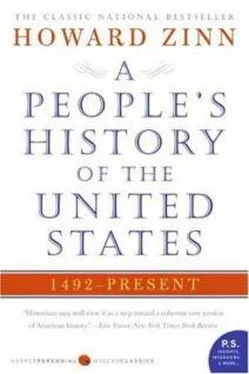Howard Zinn - A People
Здесь есть возможность читать онлайн «Howard Zinn - A People» весь текст электронной книги совершенно бесплатно (целиком полную версию без сокращений). В некоторых случаях можно слушать аудио, скачать через торрент в формате fb2 и присутствует краткое содержание. Издательство: Harper-Collins, Жанр: Фэнтези, на английском языке. Описание произведения, (предисловие) а так же отзывы посетителей доступны на портале библиотеки ЛибКат.
- Название:A People
- Автор:
- Издательство:Harper-Collins
- Жанр:
- Год:неизвестен
- ISBN:нет данных
- Рейтинг книги:4 / 5. Голосов: 1
-
Избранное:Добавить в избранное
- Отзывы:
-
Ваша оценка:
- 80
- 1
- 2
- 3
- 4
- 5
A People: краткое содержание, описание и аннотация
Предлагаем к чтению аннотацию, описание, краткое содержание или предисловие (зависит от того, что написал сам автор книги «A People»). Если вы не нашли необходимую информацию о книге — напишите в комментариях, мы постараемся отыскать её.
A People — читать онлайн бесплатно полную книгу (весь текст) целиком
Ниже представлен текст книги, разбитый по страницам. Система сохранения места последней прочитанной страницы, позволяет с удобством читать онлайн бесплатно книгу «A People», без необходимости каждый раз заново искать на чём Вы остановились. Поставьте закладку, и сможете в любой момент перейти на страницу, на которой закончили чтение.
Интервал:
Закладка:
The colonies, it seems, were societies of contending classes-a fact obscured by the emphasis, in traditional histories, on the external struggle against England, the unity of colonists in the Revolution. The country therefore was not "born free" but born slave and free, servant and master, tenant and landlord, poor and rich. As a result, the political authorities were opposed "frequently, vociferously, and sometimes violently," according to Nash. "Outbreaks of disorder punctuated the last quarter of the seventeenth century, toppling established governments in Massachusetts, New York, Maryland, Virginia, and North Carolina."
Free white workers were better off than slaves or servants, but they still resented unfair treatment by the wealthier classes. As early as 1636, an employer off the coast of Maine reported that his workmen and fishermen "fell into a mutiny" because he had withheld their wages. They deserted en masse. Five years later, carpenters in Maine, protesting against inadequate food, engaged in a slowdown. At the Gloucester shipyards in the 1640s, what Richard Morris calls the "first lockout in American labor history" took place when the authorities told a group of troublesome shipwrights they could not "worke a stroke of worke more."
There were early strikes of coopers, butchers, bakers, protesting against government control of the fees they charged. Porters in the 1650s in New York refused to carry salt, and carters (truckers, teamsters, carriers) who went out on strike were prosecuted in New York City "for not obeying the Command and Doing their Uutyes as becomes them in their Places." In 1741, bakers combined to refuse to bake because they had to pay such high prices for wheat.
A severe food shortage in Boston in 1713 brought a warning from town selectmen to the General Assembly of Massachusetts saying the "threatening scarcity of provisions" had led to such "extravagant prices that the necessities of the poor in the approaching winter must needs be very pressing." Andrew Belcher, a wealthy merchant, was exporting grain to the Caribbean because the profit was greater there. On May 19, two hundred people rioted on the Boston Common. They attacked Belchers ships, broke into his warehouses looking for corn, and shot the lieutenant governor when he tried to interfere.
Eight years after the bread riot on the Common, a pamphleteer protested against those who became rich "by grinding the poor," by studying "how to oppress, cheat, and overreach their neighbors." He denounced "The Rich, Great and Potent" who "with rapacious violence bear down all before them…"
In the 1730s, in Boston, people protesting the high prices established by merchants demolished the public market in Dock Square while (as a conservative writer complained) "murmuring against the Government amp; the rich people." No one was arrested, after the demonstrators warned that arrests would bring "Five Hundred Men in Solemn League and Covenent" who would destroy other markets set up for the benefit of rich merchants.
Around the same time, in New York, an election pamphlet urged New York voters to join «Shuttle» the weaver, «Plane» the joiner, «Drive» the carter, «Mortar» the mason, «Tar» the mariner, «Snip» the tailor, «Smallrent» the fair-minded landlord, and "John Poor" the tenant, against "Gripe the Merchant, Squeeze the Shopkeeper, Spintext and Quible the Lawyer." The electorate was urged to vote out of office "people in Exalted Stations" who scorned "those they call the Vulgar, the Mob, the herd of Mechanicks."
In the 1730s, a committee of the Boston town meeting spoke out for Bostonians in debt, who wanted paper money issued to make it easier to pay off their debts to the merchant elite. They did not want, they declared, to "have our Bread and Water measured out to Us by those who Riot in Luxury amp; Wantonness on Our Sweat amp; Toil…"
Bostonians rioted also against impressment, in which men were drafted for naval service. They surrounded the house of the governor, beat up the sheriff, locked up a deputy sheriff, and stormed the town house where the General Court sat. The militia did not respond when called to put them down, and the governor fled. The crowd was condemned by a merchants' group as a "Riotous Tumultuous Assembly of Foreign Seamen, Servants, Negroes, and Other Persons of Mean and Vile Condition."
In New Jersey in the 1740s and 1750s, poor farmers occupying land, over which they and the landowners had rival claims, rioted when rents were demanded of them. In 1745, Samuel Baldwin, who had long lived on his land and who held an Indian tide to it, was arrested for nonpayment of rent to the proprietor and taken to the Newark jail. A contemporary described what happened then: "The People in general, supposing the Design of the Proprietors was to ruin them… went to the Prison, opened the Door, took out Baldwin."
When two men who freed Baldwin were arrested, hundreds of New Jersey citizens gathered around the jail. A report sent by the New Jersey government to the Lords of Trade in London described the scene:
Two of the new captains of the Newark Companies by the Sheriffs order went with their drumms, to the people, so met, and required all persons there, belong to their companies, to follow the drums and to defend the prison but none followed, tho many were there.… The multitude… between four and five of the clock in the afternoon lighted off their horses, and came towards the gaol, huzzaing and swinging their clubbs… till they came within reach of the guard, struck them with their clubbs, and the guard (having no orders to fire) returned the blows with then- guns, and some were wounded on both sides, but none killed. The multitude broke the ranks of the soldiers, and pressed on the prison door, where the Sheriff stood with a sword, and kept them off, till they gave him several blows, and forced him out from thence. They then, with axes and other instruments, broke open the prison door, and took out the two prisoners. As also one other prisoner, that was confined for debt, and went away.
Through this period, England was fighting a series of wars (Queen Anne's War in the early 1700s, King George's War in the 1730s). Some merchants made fortunes from these wars, but for most people they meant higher taxes, unemployment, poverty. An anonymous pamphleteer in Massachusetts, writing angrily after King George's War, described the situation: "Poverty and Discontent appear in every Face (except the Countenances of the Rich) and dwell upon every Tongue." He spoke of a few men, fed by "Lust of Power, Lust of Fame, Lust of Money," who got rich during the war. "No Wonder such Men can build Ships, Houses, buy Farms, set up their Coaches, Chariots, live very splendidly, purchase Fame, Posts of Honour." He called them "Birds of prey… Enemies to all Communities-wherever they live."
The forced service of seamen led to a riot against impressment in Boston in 1747. Then crowds turned against Thomas Hutchinson, a rich merchant and colonial official who had backed the governor in putting down the riot, and who also designed a currency plan for Massachusetts which seemed to discriminate against the poor. Hutchinson 's house burned down, mysteriously, and a crowd gathered in the street, cursing Hutchinson and shouting, "Let it burn!"
By the years of the Revolutionary crisis, the 1760s, the wealthy elite that controlled the British colonies on the American mainland had 150 years of experience, had learned certain things about how to rule. They had various fears, but also had developed tactics to deal with what they feared.
The Indians, they had found, were too unruly to keep as a labor force, and remained an obstacle to expansion. Black slaves were easier to control, and their profitability for southern plantations was bringing an enormous increase in the importation of slaves, who were becoming a majority in some colonies and constituted one-fifth of the entire colonial population. But the blacks were not totally submissive, and as their numbers grew, the prospect of slave rebellion grew.
Читать дальшеИнтервал:
Закладка:
Похожие книги на «A People»
Представляем Вашему вниманию похожие книги на «A People» списком для выбора. Мы отобрали схожую по названию и смыслу литературу в надежде предоставить читателям больше вариантов отыскать новые, интересные, ещё непрочитанные произведения.
Обсуждение, отзывы о книге «A People» и просто собственные мнения читателей. Оставьте ваши комментарии, напишите, что Вы думаете о произведении, его смысле или главных героях. Укажите что конкретно понравилось, а что нет, и почему Вы так считаете.












